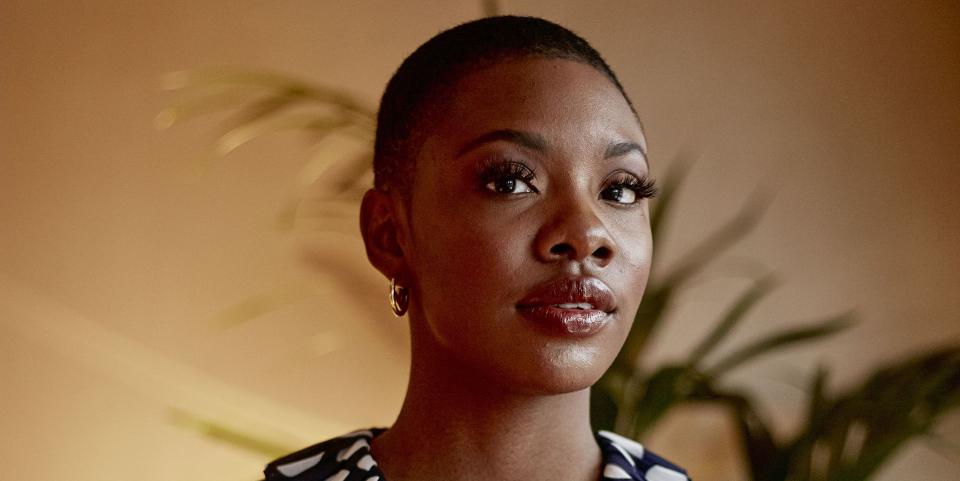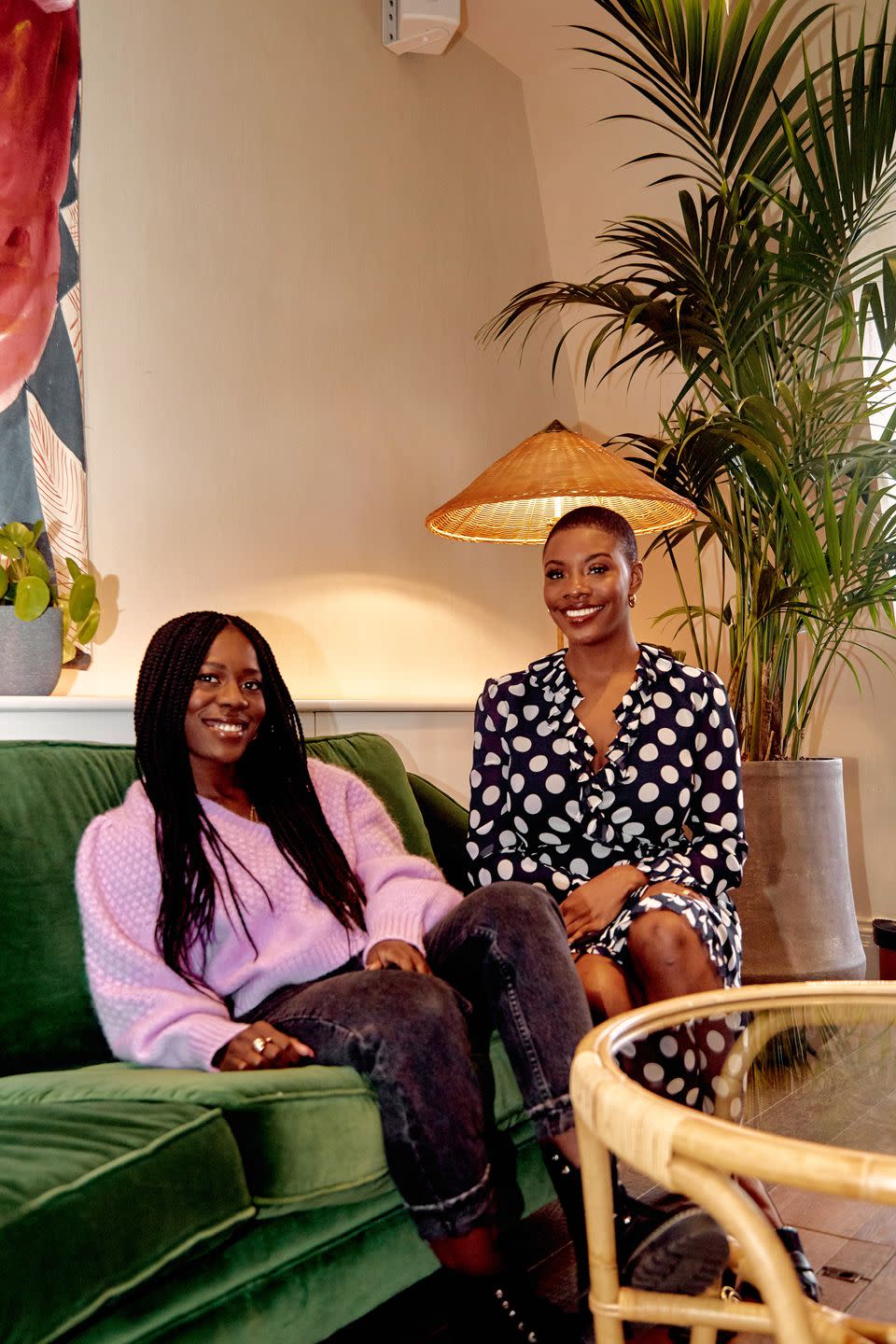'Why I'll never apologise for being a loud Black girl'

Yomi Adegoke has certainly had a 'crazy' two years since the release of her first book Slay in Your Lane, with co-author Elizabeth Uviebinené – and with the release of their new title Loud Black Girls last week, it's bound to get even crazier.
Slay in Your Lane was the first book of its kind to shine a spotlight on what it's like to be a young Black female in Britain. Guiding its readers through Black female experiences that have long been missing in mainstream conversation like Black fetishisation, micro-aggressions, underrepresentation and the importance of self-care, with the help of interviews with accomplished Black women such as Clara Amfo and Dame Maggie Pocock.
Self-titled 'The Black Girl Bible,' Uviebinené and Adegoke wanted the book to be a hands-on guide to helping young Black women 'come to the battle prepared,' with the help of inspiring women who've crossed insurmountable barriers to 'slay in their proverbial lanes,' with great success.
'I think [it] did so well, because it was doing something that just hasn’t been done in the UK in this way before,' says 26 year-old Adegoke. 'There's that famous quote by Toni Morrison "If there's a book you really want to read, but it hasn't been written yet, then you must write it" – that's essentially what we did with Slay in Your Lane.'
Now, two years on, when the topics of diversity and racism are at the forefront of conversations, they turn from learning from the past to looking to the future, with Loud Black Girls: an anthology of essays from 20 accomplished and aspiring writers.
Featuring authentic experiences of what it's like to be a Black woman today, the essays range from Adegoke's favourite passage, written by her sister Yemsi (a journalist for BBC Africa) about what it's like to be a returnee to your native country – despite having never lived there – to blogger and author of I Am Not Your Baby Mother, Candice Brathwaite's powerful piece on teaching her daughter to speak up.
'It was a much easier process than with Slay in Your Lane,' she says, explaining that she and Uviebinené had to pin down people that they'd never met, to ask them to take part in the first book. This was made even harder by the fact that 'there are very few Black women in the UK across all the different industries'.
Whereas with Loud Black Girls, the pair already had a bestselling book under their belt, had certain networks available to them (Adegoke is an established and well-known journalist) and people they were already big fans of, like Candice Brathwaite, wanting to work with them.
'For a lot of them, even if we didn’t already know who they were, we were aware of them and keenly following their work,' she says, 'so it was just a matter of reaching out and seeing if they said yes.'
Luckily most people did, with Adeogoke even securing Booker Prize winner Bernadine Evaristo (author of bestselling title Girl, Woman, Other) to write the book's foreword. This was after she interviewed her on the Gal-Dem panel at a festival, the day after Evaristo won the coveted literary award.
'We all expected her not to come [after that]... but Bernadine being Bernadine, she still came to the event and spoke,' Adeogoke explains.
It certainly feels like we're finally hearing and reading more from Black writers. But, alongside the excitement that brings, lies a fear that the current focus on diversity is treated almost like a trend. Something that understandably worries Adegoke.
'I always say, for something to be in fashion it has to fall out of fashion,' she warns. 'I just don’t want it to be a trend. Trends by their nature don’t last forever.'
The only viable way to ensure this doesn't happen is to look at implementing change 'in a sustainable, long-term way,' she says.
Uviebinené and Adegoke both found themselves pushing the conversation forward and asking: 'What's next?' as they toured the country promoting Slay In Your Lane; having conversations with people about what it means to be a Black woman in Britain today.

'It became very important for us to look to the new generation of creatives, writers, and thinkers and find out what their understanding is [of being a Black woman],' Adegoke says, although the actual conception of Loud Black Girls is 'kind of a blur'.
'I don’t know if there was a real Eureka! moment,' she says, admitting that the book's name was the only purposeful decision made at the time. 'I suggested Loud Black Girls as a reclamation of what’s often been used as a slur to Black women,' – a stereotype Adegoke often had to deal with herself, growing up in Croydon.
'I am generally quite loud. I’m sonically a loud person, but there’s a difference between being actually loud in terms of decibels, and there being a personality trait of loudness,' she says, remembering how at school, she and her group of introverted, mostly Ghanaian friends (known for being culturally reserved) would be treated differently to their white peers.
'At school, behaviours that were essentially teenage – like talking in class, giggling and sitting at the back of the bus – were often viewed through a lens of loudness and disruptiveness,' she adds.
'It’s interesting how [that stereotype] is so easily projected onto Black women, regardless of what their personalities actually are.'
This is the stereotype the authors hope to reclaim with their new book, which features an incredibly diverse range of experiences of being a Black woman in Britain today. A happy coincidence, according to Adegoke.
'We were worried everyone was going to write the same,' she admits, revealing that the pair had 'surprisingly little input' into the content of each essay, simply asking each author to write about authentic experiences that mattered to them.
'When you give young, Black women the opportunity to write about themselves and their experiences completely authentically, you'll be pleasantly surprised about what we have to say.'
Adegoke notes that, in the media, it's all too common to only hear Black women’s voices called upon to comment on certain issues, at certain times – like immediately following the tragic death of African-American man George Floyd in police custody and the subsequent global Black Lives Matter protests, earlier this year. So is this book aimed at educating non-Black people about the Black experience?
'For people who aren’t Black or female, it’s educational, in terms of understanding an experience outside of your own,' explains Adegoke, but she insists the main aim of the book is simply to allow Black women to tell their authentic, lived experiences, regardless of timing, agenda or age.
In fact, one of the famous Black women they interviewed for Slay In Your Lane, Margaret Busby, is in her 80s now, and has 'fostered some amazing conversations'.
Grandmothers who experienced micro-aggressions and misogynoir in the 50s and 60s now have a name for what they experienced beyond just 'racism', Adegoke explains.
'We have women who are truly reading about their experiences and having it reflected back to them in a way that they haven’t had before, which is very validating.'
Loud Black Girls by Yomi Adegoke and Elizabeth Uviebinené is out now.
Subscribe to Red now to get the magazine delivered to your door. Red's latest issue is out now and available for purchase online and via Readly or Apple News+.
Like this article? Sign up to our newsletter to get more articles like this delivered straight to your inbox.
You Might Also Like


